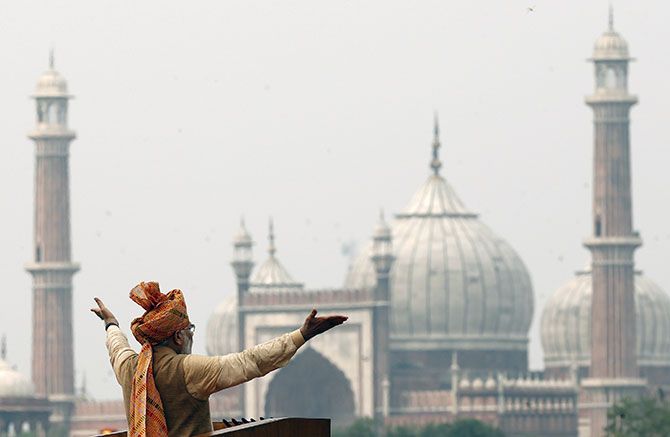'Modi didn't face such belligerence in his home state. Moreover, as the prime minister, he can no longer resort to his earlier ploy of describing every attack on himself as an attack on Gujarat. Instead, he has to rebut the charges with calm logic,' says Amulya Ganguli.

The essence of the Peter Principle is that a promotion is carried out on the basis of a person's success in the last job rather than his aptitude for the next one.
The expectation obviously is that he will be able to perform satisfactorily in his new position because of an innate capability to deal with problems even if they vary from one job to another.
Related to this principle, which was enunciated by the Canadian educationist, Laurence J Peter, half a century ago, is the maxim that army generals always fight the last battle, meaning that tactically they are one step behind when fighting a new battle since they are unable to adjust themselves to a new and evolving situation.
To a considerable extent, these theories are relevant in Narendra Modi's case. He was chosen by the Bharatiya Janata Party because he was a successful chief minister, having won three elections in a row in Gujarat under what can be called extremely adverse political circumstances in view of the animosity which he aroused in the aftermath of the 2002 riots.
Although the BJP had other chief ministers who had also won three successive terms like Modi, the latter gave the impression of being a strong man, a trait which is much admired in the party and the Sangh Parivar and also by the general public. He is also an effective speaker.
However, in nominating him as the party's prime ministerial candidate, the BJP acted in contravention of the Peter Principle's warning. Arguably, the validity of this caution has been largely proved, for it is now clear that Modi is unlikely to be as successful a prime minister as he was as a chief minister.
It is possible that he will win a second term in 2019. As a recent opinion poll has shown, the BJP and its allies will be ahead of their opponents in the next general election.
But the reason for their success will be a negative one in the sense that it will be the failure of the Opposition to reach out to the electorate which will help the BJP rather than any special appeal of the latter.
This wasn't the case last year. If the BJP easily outran its main adversary, the Congress, in the general election and in some of the state elections, the reason was the expectations of economic growth which Modi generated by his oratorical skills.
But while this aptitude enabled him to stave off the criticisms he faced in Gujarat by accusing his opponents of hurting the state's pride (asmita), it hasn't been enough at the national level to help him to explain the delay in ushering in the promised achhe din or good days.
True, Modi has been unlucky in having an opponent as bloody-minded as the Congress, which is not apologetic about stalling a measure like the Goods and Services Tax bill, which the party itself had once sponsored, on the grounds that the BJP also disrupted the parliamentary proceedings when it was in the Opposition.
Since Modi hadn't faced such tit-for-tat methods in Gujarat, he does not seem to know how to deal with hurdles of this nature. Although the weakness of the Congress in Gujarat has been replicated in Parliament as well because the party has sunk to its lowest ever level, the very vulnerability of the Grand Old Party seems to have compelled it to become extra aggressive in order to prevent its demoralised followers from drifting away.
Again, Modi didn't face such belligerence in his home state. Moreover, as the prime minister, he can no longer resort to his earlier ploy of describing every attack on himself as an attack on Gujarat. Instead, he has to rebut the charges with calm logic.
But the continuing problems -- economic stagnation with Moody's lowering growth forecasts, parliamentary logjam, FTII agitation, high onion prices, India-Pakistan standoff, dwindling number of listeners to his radio broadcasts -- seem to have put him on the defensive.
Among other chief ministers who became prime ministers, only P V Narasimha Rao is likely to be mentioned in several paragraphs in history books both for his achievements such as the introduction of economic reforms, and failures such as sleeping through a wintry afternoon when the Babri Masjid was brought down.
Others like Charan Singh and H D Deve Gowda will be mere footnotes.
There is little doubt that Modi will get much greater attention from historians, not least because his transformation from a 'hate figure to an avatar of modernity and progress,' as Congress MP Shashi Tharoor has said, will be a matter of endless speculation.
The paragraphs devoted to him will grow in number if he is able to pursue the economic reforms with greater vigour and is able to keep the saffron fundamentalists in check, as he has been doing with some success in recent weeks.
Otherwise, the dire prediction of the Peter Principle will prove to be true.
Amulya Ganguli is a Delhi-based political commentator.
IMAGE: Prime Minister Narendra Modi addresses the nation from the Red Fort on Independence Day. Photograph: Adnan Abidi/Reuters










